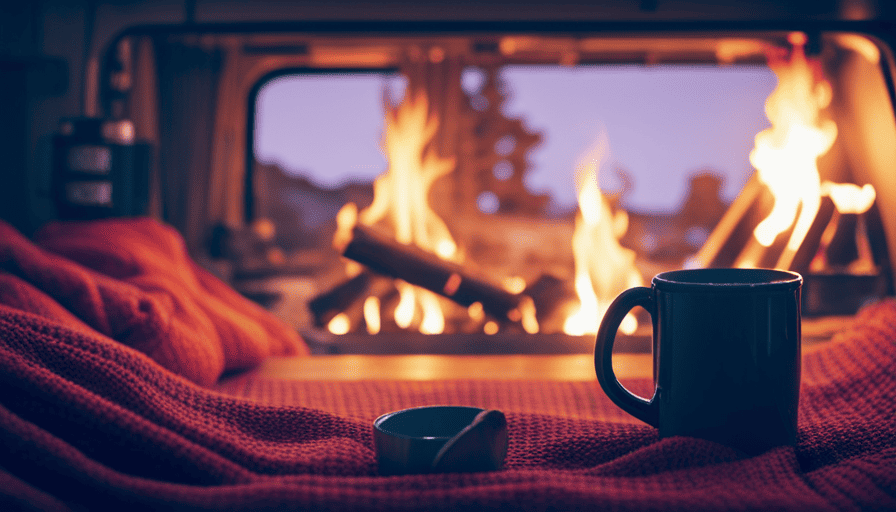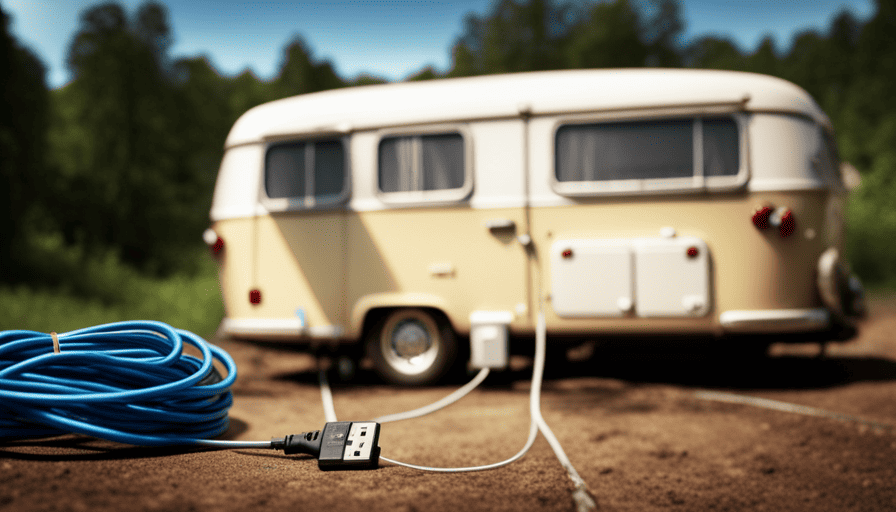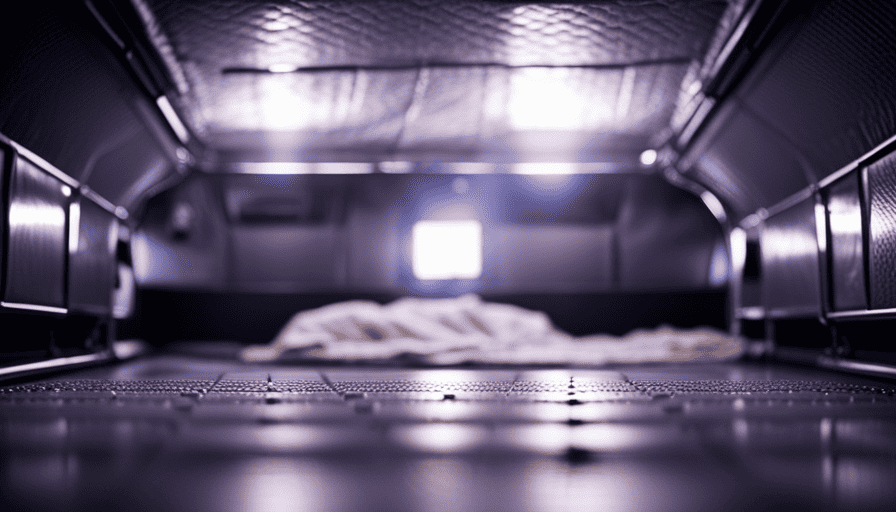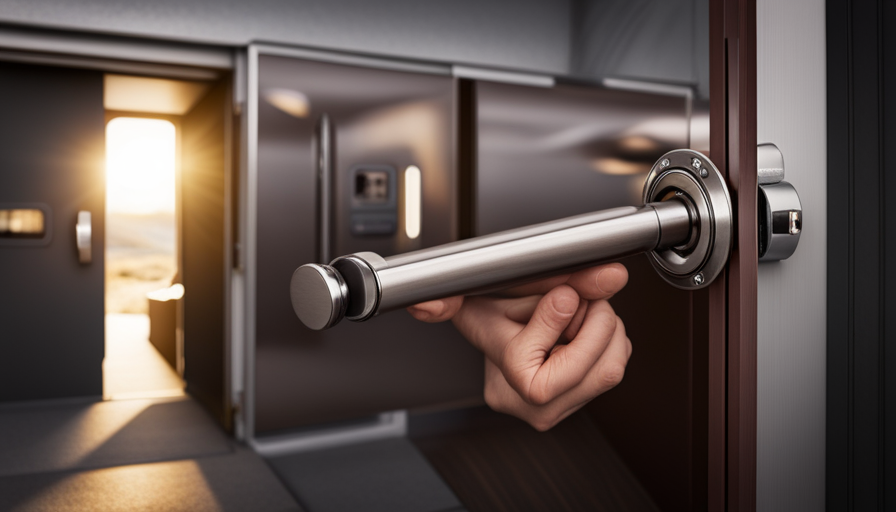Living in a camper allows for a sense of freedom and excitement. Imagine waking up every day to breathtaking natural landscapes, having the freedom to travel wherever you desire, and breaking away from typical housing limitations.
But before you embark on this exciting journey, you may be wondering, ‘How much does it really cost to live in a camper?’ Well, hold onto your seats because I’m about to uncover the truth behind the expenses of this unconventional lifestyle.
From the initial purchase costs of different types of campers to the monthly expenses, maintenance and repairs, utilities and amenities, and even unexpected expenses, we’ll delve into every aspect of camper living.
So, if you’re ready to embrace a nomadic lifestyle and want to plan your finances accordingly, join me in this informative and analytical exploration of the costs associated with living in a camper.
Key Takeaways
- Living in a camper offers a liberating and adventurous experience.
- Campers provide the comforts of home and the freedom to travel.
- Initial purchase costs vary based on size, type, and new vs. used options.
- Monthly expenses include campground fees, fuel, and propane.
Types of Campers Available
If you’re considering living in a camper, you’ll be pleased to discover the wide range of types available to suit your specific needs and preferences. From traditional motorhomes to compact teardrop trailers, there’s a camper for every lifestyle.
Motorhomes offer the most space and amenities, with options ranging from Class A, which resemble buses, to Class C, which are built on a truck chassis. They provide the comforts of home, including a kitchen, bathroom, and sleeping quarters, but can be more expensive to purchase and maintain.
On the other hand, teardrop trailers are smaller and more affordable, making them perfect for those who want a simple and minimalist lifestyle. They are easy to tow and can be parked in smaller spaces. However, they lack the space and amenities of larger campers.
Living in a camper has its pros and cons. On the positive side, campers allow you to travel and explore new places while enjoying the comforts of home. They provide a sense of freedom and flexibility, as you can easily change your location whenever you desire. Additionally, campers often come with outdoor living spaces, such as awnings or patio areas, allowing you to enjoy the outdoors.
However, there are downsides to consider as well. Limited space can be a challenge, especially if you have a large family or accumulate a lot of belongings. Maintenance and repair costs can also add up over time. Despite these drawbacks, living in a camper can be a cost-effective and adventurous way to embrace a nomadic lifestyle.
Transitioning into the subsequent section about ‘initial purchase costs’, it’s important to understand the financial aspects of living in a camper.
Initial Purchase Costs
You’ll be amazed at the jaw-dropping price tag for snagging your very own cozy home on wheels! When considering the initial purchase costs of a camper, there are a few key factors to take into account.
Here are some initial purchase considerations to keep in mind:
-
Size and type of camper: The cost of campers can vary greatly depending on their size, features, and overall quality. From small pop-up trailers to luxurious Class A motorhomes, there is a wide range of options to suit different budgets and preferences.
-
New vs. used: Buying a brand-new camper will generally come with a higher price tag compared to purchasing a used one. However, used campers can offer cost savings, so it’s important to weigh the pros and cons of each option.
-
Financing options: If you’re unable to pay the full purchase price upfront, there are financing options available. Many banks, credit unions, and RV dealerships offer loans specifically for purchasing campers, allowing you to spread the cost over time.
-
Insurance and maintenance: It’s essential to factor in the cost of insurance and regular maintenance when considering the overall expenses of owning a camper.
Transitioning into the subsequent section about ‘monthly expenses,’ it’s important to understand the initial purchase costs before delving into the ongoing financial commitments of living in a camper.
Monthly Expenses
Get ready to dive into the world of monthly expenses and discover the financial realities of living the nomadic life in your cozy home on wheels! When it comes to monthly expenses, one of the biggest advantages of living in a camper is the potential for significant savings. Depending on your lifestyle and location, you can save a substantial amount of money by not having to pay rent or mortgage. Instead, you’ll have monthly expenses such as campground fees, fuel, and propane.
Campground fees can vary widely, ranging from free dispersed camping on public lands to around $30-$50 per night at private campgrounds with full hookups.
Another important expense to consider is insurance. Just like with any other vehicle, your camper will need insurance coverage. The cost of insurance will depend on several factors, including the value of your camper, your driving record, and the coverage options you choose. On average, you can expect to pay anywhere from $50 to $200 per month for camper insurance.
As we move into the next section about maintenance and repairs, it’s important to note that these costs can vary greatly depending on the age and condition of your camper.
Maintenance and Repairs
Taking care of your home on wheels requires regular maintenance and occasional repairs to keep it in top shape. Here are some maintenance costs and common repairs that you should be aware of when living in a camper:
-
Routine Maintenance: Just like any other vehicle, your camper will require regular maintenance such as oil changes, tire rotations, and brake inspections. These costs can vary depending on the size and type of your camper.
-
Roof Repairs: One of the most common issues with campers is roof leaks. It’s important to regularly inspect and maintain the roof to prevent any water damage. Repairing roof leaks can range from simple patching to more extensive repairs, which can be costly.
-
Plumbing Repairs: Leaky faucets, clogged drains, and faulty water pumps are common plumbing issues in campers. These repairs can be relatively inexpensive if you can fix them yourself, but hiring a professional can increase the cost.
-
Electrical System Repairs: Issues with the electrical system, such as faulty wiring or blown fuses, can arise in campers. Hiring a professional electrician to diagnose and fix these problems can be expensive.
Transitioning into the next section about ‘utilities and amenities’, it’s important to consider the costs of maintaining and repairing your camper alongside the expenses associated with utilities and amenities.
Utilities and Amenities
When living in a camper, it’s important to consider the availability and cost of utilities and amenities. First, water and electricity are essential for daily living, and the cost can vary depending on the location and usage.
Second, internet and connectivity are crucial for staying connected with the outside world, and there are different options available such as mobile data plans or campground Wi-Fi.
Lastly, waste disposal is a necessary aspect to address, and it may involve using dump stations for sewage and finding suitable locations for garbage disposal.
Water and Electricity
Living in a camper can be affordable, but it’s important to consider the cost of water and electricity. When living in a camper, water conservation is key. Limited water tank capacity means being mindful of water usage and finding ways to conserve, such as taking shorter showers and using water-saving appliances.
Additionally, utilizing solar power can significantly reduce electricity costs. Installing solar panels on the roof of the camper allows for harnessing the sun’s energy to power appliances and charge batteries. This alternative energy source not only saves money but also promotes sustainability.
As we transition into the next section about ‘internet and connectivity,’ it’s important to consider the impact of these utilities on the overall cost of living in a camper.
Internet and Connectivity
If you think staying connected to the internet while living in a camper is a walk in the park, think again, because finding a reliable signal can sometimes feel like searching for a needle in a haystack. In the digital nomad lifestyle, having a stable internet connection is crucial for remote work options.
Here are some challenges to consider:
-
Limited Coverage: Campgrounds and RV parks may offer Wi-Fi, but the signal can be weak and unreliable.
-
Data Caps: Many cellular providers impose data limits on their plans, which can be quickly exceeded with continuous internet usage.
-
Signal Interference: The metal walls of a camper can weaken Wi-Fi and cellular signals, making it harder to connect.
-
Rural Locations: If you prefer staying in remote areas, you may encounter limited or no internet access.
-
Connectivity Costs: Investing in external antennas or boosters can improve signal strength, but it comes at an additional expense.
Now, let’s discuss waste disposal and how it fits into the camper lifestyle.
Waste Disposal
Dealing with waste disposal in a camper can be a real challenge. Waste management is crucial to maintaining a clean and healthy living environment. Fortunately, there are environmentally friendly options available.
One option is to use composting toilets, which convert human waste into compost that can be safely disposed of. These toilets are odorless and require little to no water, making them ideal for campers.
Another option is to use biodegradable and eco-friendly cleaning products to minimize the impact on the environment.
It is important to properly dispose of waste by using designated dump stations or facilities.
Transitioning to the next section about ‘food and groceries’, it is essential to consider how waste from cooking and food packaging is managed in a camper.
Food and Groceries
Shopping for food and groceries while living in a camper can be budget-friendly and convenient. With limited storage space, it’s important to plan ahead and make strategic grocery shopping trips. Meal planning becomes essential to avoid wastage and maximize the use of ingredients. By creating a weekly meal plan, I can buy the necessary items and avoid unnecessary purchases. This helps me stay within my budget and reduces food waste.
When grocery shopping, I opt for non-perishable items that have a long shelf life. Canned goods, dried fruits, and pasta are staples in my pantry. I also buy fresh produce that can last for a few days, such as apples, carrots, and lettuce. To save money, I look for discounts and buy in bulk whenever possible. This way, I can stock up on essentials without breaking the bank.
Cooking in a camper can be a bit challenging due to limited kitchen space, but with some creativity, I can whip up delicious and nutritious meals. I make use of versatile ingredients that can be used in multiple dishes. For example, a can of beans can be used in a salad, a soup, or a burrito filling. This not only saves money but also reduces the amount of food waste generated.
Transitioning into the subsequent section about entertainment and recreation, I find that cooking in the camper allows me to explore different recipes and experiment with flavors. It becomes a form of entertainment in itself, as I try to create tasty meals with the limited resources available.
Entertainment and Recreation
When you’re on the road, exploring new places and living in a camper, your entertainment options are as endless as the open road itself. Whether you enjoy outdoor activities or prefer a more relaxed approach to recreation, there is something for everyone when it comes to entertainment and recreation in a camper.
-
Outdoor activities: Living in a camper gives you the opportunity to fully immerse yourself in nature. You can go hiking, fishing, or even try your hand at birdwatching. The possibilities are endless when it comes to enjoying the great outdoors.
-
Camping gear: To fully enjoy your outdoor activities, having the right camping gear is essential. From tents and sleeping bags to cooking equipment and portable chairs, investing in quality camping gear will enhance your overall experience and make your time in the camper even more enjoyable.
-
Exploring new places: One of the greatest perks of living in a camper is the ability to easily explore new places. Whether it’s visiting national parks, historical landmarks, or quaint small towns, the open road is your gateway to endless adventures.
-
Socializing with fellow campers: When living in a camper, you’ll often find yourself surrounded by like-minded individuals who share a love for the outdoors. This presents a great opportunity to socialize and make new friends along the way.
Transitioning into the subsequent section about ‘health and safety’, it’s important to prioritize your well-being while living in a camper.
Health and Safety
Ensuring the well-being and safety of oneself is of utmost importance while living a nomadic lifestyle in a camper. One aspect of maintaining good health is having proper health insurance coverage. It is essential to research and choose a plan that fits one’s needs and covers medical expenses while on the road. Additionally, practicing fire safety is crucial in a confined space like a camper. Installing smoke detectors and fire extinguishers can help prevent accidents and minimize damage in case of a fire. It is also important to have a clear evacuation plan and regularly check the camper for any potential fire hazards.
To further illustrate the importance of health insurance and fire safety, the following table provides a comparison of different health insurance plans and their coverage options, as well as a checklist of fire safety measures to implement in a camper:
| Health Insurance Plans | Coverage Options |
|---|---|
| Plan A | Comprehensive |
| Plan B | Basic |
| Plan C | Emergency Only |
Fire Safety Checklist:
- Install smoke detectors.
- Keep a fire extinguisher within reach.
- Regularly check wiring and electrical systems.
- Avoid overloading electrical outlets.
- Have a clear evacuation plan.
Considering the potential risks to health and safety, it is vital to be prepared for unexpected expenses that may arise from these situations.
Unexpected Expenses
When living in a camper, unexpected expenses can arise in various forms.
Vehicle breakdowns can be a major concern, especially if you rely on your camper for transportation.
Emergencies and accidents can also occur, which may require immediate attention and financial resources.
Additionally, as your camper ages, you may find yourself needing to replace or upgrade certain components, such as appliances or tires, to ensure its continued functionality and safety.
Vehicle Breakdowns
If you hit a snag with a breakdown, you’ll be glad to have an emergency fund set aside for unexpected vehicle repairs while living in a camper. Vehicle maintenance is crucial when you’re constantly on the road, and breakdowns can happen at any time.
Here are three reasons why having an emergency fund for vehicle breakdowns is essential:
-
Cost of repairs: Vehicle repairs can be expensive, especially if you need to replace major components like the engine or transmission. Having an emergency fund can help cover these costs without putting a strain on your budget.
-
Roadside assistance: When your camper breaks down, you may need to call for roadside assistance. While some insurance policies cover this service, others may require you to pay out of pocket. An emergency fund can help you cover these unexpected expenses.
-
Peace of mind: Knowing that you have a financial safety net in case of a breakdown can give you peace of mind while living in a camper. It allows you to enjoy your journey without constantly worrying about unexpected vehicle repairs.
With vehicle breakdowns being one aspect of unexpected expenses, it’s important to also be prepared for emergencies and accidents while living in a camper.
Emergencies and Accidents
One interesting statistic to consider is that the average cost of medical expenses after a camper accident is significantly higher than the cost of vehicle repairs.
Emergencies and accidents can happen while living in a camper, just like in any other living situation. It is important to be prepared for these situations and have insurance coverage that can help cover the costs. Accidents can result in injuries that require medical attention, and the costs associated with medical care can quickly add up. Having insurance coverage can provide some financial protection in these situations. It is also important to note that insurance coverage for campers may vary, so it is crucial to review and understand the policy before any accidents occur.
With that in mind, let’s move on to the next section about replacement and upgrades.
Replacement and Upgrades
After discussing emergencies and accidents in the previous section, it’s important to consider the various replacement options and interior upgrades available for campers.
When it comes to replacements, it’s essential to have a reliable plan in place for any necessary repairs or part replacements. This could involve researching and budgeting for common replacements like tires, batteries, or even appliances.
Additionally, many camper owners choose to upgrade the interior of their vehicles to enhance their living experience. This might include installing new flooring, updating the kitchenette, or adding more storage space. By investing in these upgrades, you can create a more comfortable and personalized living space.
Transitioning into the next section about budgeting and financial planning, it’s crucial to consider these replacement and upgrade costs when determining the overall cost of living in a camper.
Budgeting and Financial Planning
When budgeting and planning financially for a camper lifestyle, it’s crucial to envision a picturesque life on the road while keeping costs in mind. Budgeting tips and saving strategies are essential for those considering this lifestyle.
First and foremost, it’s important to determine a realistic budget for your camper life. Consider all expenses, such as purchasing or renting the camper, maintenance, fuel, and campground fees. Researching different camping options can help you find affordable places to park your camper. Additionally, setting aside money for emergencies is crucial as unexpected repairs or medical expenses can arise.
It’s also wise to create a monthly budget and track your expenses to ensure you’re staying on track. To save money, consider downsizing your belongings and living a minimalist lifestyle. This will not only reduce costs but also make the camper living experience more manageable.
Finally, look for ways to earn income while on the road, such as remote work or freelance opportunities. By following these budgeting tips and saving strategies, you can make your camper lifestyle financially sustainable and enjoyable.
Frequently Asked Questions
Can I live in a camper full-time?
Living in a camper full-time has its pros and cons. On the positive side, it offers freedom, flexibility, and the ability to travel. However, it also requires adjusting to a smaller living space and limited amenities.
Essential amenities to consider include a bathroom, kitchen, and sleeping area. While it can be an affordable lifestyle choice, it’s important to factor in maintenance, campground fees, and potential repair costs.
Overall, living in a camper full-time requires careful planning and consideration of personal preferences and needs.
How do I find places to park my camper for extended periods of time?
When looking for long-term parking spots for my camper, I start by researching RV parks and campgrounds that offer extended stays. I also check for state and national parks that allow extended stays. It’s important to inquire about availability and any restrictions, such as length of stay or hook-up options. To stay connected to utilities while parked for extended periods, I utilize RV hook-ups for electricity, water, and sewage.
What are some tips for maximizing space and storage in a camper?
Maximizing space and storage in a camper is like solving a complex puzzle. To make the most of your limited space, consider using vertical storage solutions like hanging organizers or shelves.
Utilize multipurpose furniture, such as beds with built-in storage or collapsible tables.
Keep essentials organized by using bins or baskets for different categories.
Additionally, utilize under-bed storage and make use of every nook and cranny to optimize your living space.
Are there any legal requirements or regulations I should be aware of when living in a camper?
When it comes to living in a camper, there are several legal requirements and regulations that one should be aware of. These regulations can vary depending on the location, but some common ones include obtaining the necessary permits, adhering to zoning laws, and following safety standards.
It’s crucial to research and understand these regulations to ensure a smooth and legal living experience in a camper.
How do I handle mail and other important documents while living in a camper?
Handling mail and important documents while living in a camper can be a real adventure. It’s like playing a never-ending game of hide and seek. But fear not, fellow nomads, I’ve got some tips and solutions for you.
First, set up a mail forwarding service to ensure your mail reaches you wherever you roam.
Second, go digital and opt for online statements and electronic documents whenever possible.
And finally, invest in a secure lockbox or safe to keep your important papers safe and sound.
Happy camper, happy mail!
Conclusion
In conclusion, living in a camper offers a unique and cost-effective lifestyle. From the initial purchase costs to monthly expenses and unexpected expenses, it’s important to carefully budget and plan for all aspects of camper living.
While there may be challenges and maintenance required, the freedom and flexibility that comes with living in a camper is worth it. So, whether you’re seeking adventure or looking to simplify your life, living in a camper can be a fulfilling and affordable choice.










